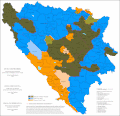Proposed Bosniak republic
This article has multiple issues. Please help improve it or discuss these issues on the talk page. (Learn how and when to remove these messages)
|
A Bosniak republic, or Bosniak entity, was proposed during the Bosnian War when plans for the partition of Bosnia and Herzegovina were made. It would either be established as one of three ethnic states in a loose confederation,[1] or as an independent "Bosniak state" in the area controlled by the Bosnian Army, as unofficially proposed by some Bosniak leaders. Thus, the Bosniak-inhabited territories or Bosnian Army-controlled area (the Republic of Bosnia and Herzegovina) would become a Bosniak state, as Republika Srpska was for the Bosnian Serbs and Herzeg-Bosnia for the Bosnian Croats. The failed 1992 Serb–Croat Graz agreement would see a small Bosniak buffer state, pejoratively called "Alija's Pashaluk" on a map displayed during the discussions.[2] The Owen-Stoltenberg plan (July 1993) would give Bosniaks 30% of territory, including ca. 65% of the Bosniak population (according to the 1991 census).The Dayton Agreement (November–December 1995) ended the war and created the federal republic of Bosnia and Herzegovina (BiH), made up of two entities, the Bosniak and Croat-inhabited Federation of Bosnia and Herzegovina (FBiH), and the Serb-inhabited Republika Srpska (RS). As noted by international relations expert Niels van Willigen: "Whereas the Bosnian Croats and Bosnian Serbs could identify themselves with Croatia or Serbia respectively, the absence of a Bosniak state made the Bosniaks firmly committed to Bosnia as a single political entity."[3]
Propaganda texts appeared in 1996, after the war, calling for a Bosniak state.[4] Secular Bosniaks have warned that a partition is not an option.[5]
Many Croat political organizations, including the Croatian National Assembly, call for the partition of the Federation to create a Croat federal unit; most proposals entail the remainder of the territory of the Federation becoming, either de facto or formally, a Bosniak entity.
- Ethnic composition in 1991
- Military control before Dayton (1995)
- Proposed Croat and Bosniak entities in Bosnia and Herzegovina
- Ethnic composition of Bosnia and Herzegovina in 2013
See also
[edit]- Zulfikarpašić–Karadžić agreement
- Croat entity in Bosnia and Herzegovina
- Partition of Bosnia and Herzegovina
- Peace plans proposed before and during the Bosnian War
- Proposed secession of Republika Srpska
References
[edit]- ^ Kostić 2007, p. 78.
- ^ Blaine, Harden (1992-05-08). "Warring Factions Agree on Plan to Divide up Former Yugoslavia". The Washington Post. Retrieved 2009-08-11.
- ^ Niels van Willigen (18 July 2013). Peacebuilding and International Administration: The Cases of Bosnia and Herzegovina and Kosovo. Routledge. pp. 52–. ISBN 978-1-134-11725-3.
- ^ FBIS Daily Report: East Europe. The Service. 1996. p. 20.
- ^ Timothy Garton Ash (2000). History of the present: essays, sketches and despatches from Europe in the 1990s. Penguin. p. 374. ISBN 978-0-14-028318-1.
Sources
[edit]- Kostić, Roland (2007). Ambivalent Peace: External Peacebuilding Threatened Identity and Reconciliation in Bosnia and Herzegovina. Ambivalent Peace. pp. 78–. ISBN 978-91-506-1950-8.
- Trnka, Kasim (2000). Konstitutivnost naroda: povodom odluke Ustavnog suda Bosne i Hercegovine o konstitutivnosti Bošnjaka, Hrvata i Srba i na nivou entiteta. Vijeće Kongresa bošnjačkih intelektualaca. ISBN 978-9958-47-072-1.
- Velikonja, Mitja (2003). Religious Separation and Political Intolerance in Bosnia-Herzegovina. Texas A&M University Press. pp. 278–. ISBN 978-1-60344-724-9.


 French
French Deutsch
Deutsch


